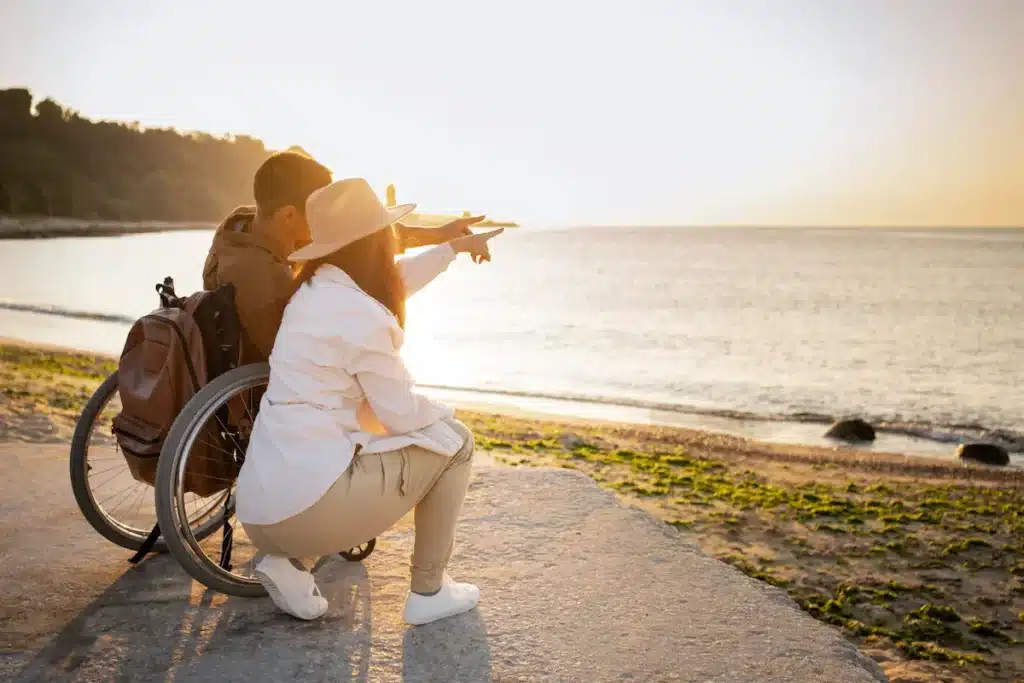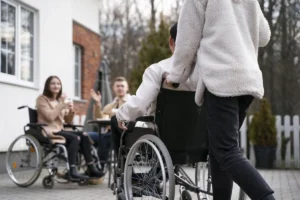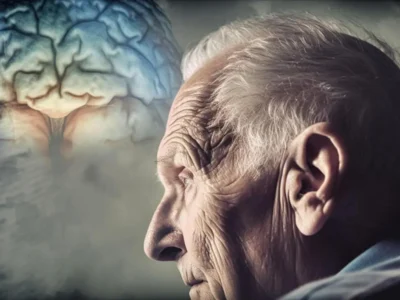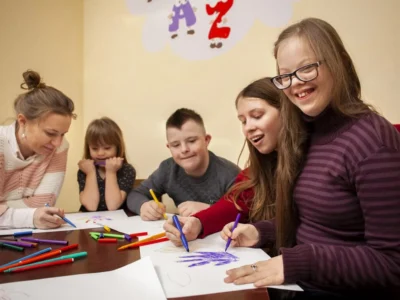In this article Jaime Villar, an employee of a travel agency specializing in people with disabilities, tells us all about the benefits of leisure and tourism for people with disabilities.
We all love to travel: discover new destinations, new friends… But in the case of people with disabilities, this is not just a pleasure; traveling also has a therapeutic component. It has been shown that travel increases social skills, communication abilities and self-esteem. In addition, with ContigoMas Viajes (an agency specialized in trips for people with disabilities of any kind), travelers have the opportunity to participate in the entire organization and decision-making process, thereby promoting the capacity for self-management in daily life.
Today we are going to tell you about some of the benefits of traveling, focusing on people with disabilities or any type of special needs.

Benefits of travel for people with disabilities
1. A first step to leave the comfort zone
Traveling, especially when it involves long distances, means preparing for new experiences. Getting to know different cultures and customs, being surprised by different ways of dressing…
This requires an exercise of empathy and patience, since we must be prepared to make ourselves understood in everyday situations, changing our perspective. What for us may be a gesture that denotes a tremendous lack of manners, in another part of the world may be a sign of respect and admiration toward the stranger who presents himself before another community, willing to share new life experiences.
Obviously, this generates a broadened outlook, which makes us aware of how small the human primary environment is.
But new experiences always bring a prior “fear” of the unknown. An instinctive and primal sense of danger that threatens our emotional stability. At the same time, there is a feeling of attraction, like when a child feels the need to play a prank, even knowing they risk being punished. But the thirst for adventure is stronger than anything else. This is what we call “stepping out of the comfort zone.”
We all urgently need to leave our comfort region from time to time. But what about people with disabilities?
The world of any person with a disability is involuntarily limited by invisible social barriers, which make it more difficult to overcome small obstacles that, for the rest of society, are mere trifles. So when a person with a disability leaves their comfort zone, it’s as if invisible walls as tall as skyscrapers fall. As if the Great Wall of China stood between a person and their dreams, and suddenly they brought it down with sledgehammers.
Every small achievement is greater when attained through effort and perseverance. And a self-esteem strengthened in the face of adversity is the first and main consequence that traveling has for people with any type of disability. Even more so when we consider that expanding our horizons means breaking the daily routine, meeting new friends, and increasing our ability to relate to others.

Subscribe
to our
Newsletter
2. Traveling increases social skills
As we mentioned earlier, traveling increases our ability to put ourselves in someone else’s shoes, which means an ease in empathizing with the specific situations of other people.
Also, leaving our closest circle forces us to talk to strangers and, many times, to make ourselves understood. What may seem unimportant becomes a great tool to improve our communication skills. Because someone who can make a new friend in a different, and sometimes hostile, environment is capable of speaking in front of a public audience, having acquired resources and tools for presenting themselves.
On the other hand, travel provides us with memories and knowledge that we can use when defending a position, an argument, or perhaps a presentation in front of our bosses or clients.
Travel makes us more sociable and more social. It teaches us to start conversations and gives us the “aces up our sleeve” that we all need from time to time to overcome shyness.
Moreover, traveling increases creative abilities. Today there are organized trips focused on providing inspiration to work from. Renowned chefs, painters, architects, perfumers, designers… they all use travel as a stimulus to connect with the muses, making the new ideas gathered during the experience become sources to draw on when creating new projects.
Finally, travel makes our brain store memories and experiences that increase our cultural knowledge. Because if you visit the Louvre, you may not remember all its works. But in your head you will keep a small painting done in “Sfumato” called “La Gioconda.” Or maybe an Egyptian sarcophagus covered in gold… Those ancient treasures, or the mummy lying inside a transparent glass case, on display for every curious tourist.
Therefore, travel also increases the cognitive abilities of every human being.
Let’s add all this up Right Now and apply it to the case at hand. People with a disability, both physical and intellectual, often need an external stimulus that increases their psychosocial skills, as well as cognitive capacity and daily life management. For all these reasons, travel opens up an immense range of possibilities to exercise each of these areas.
3. «Mens Sana» boosted by travel: benefits for the brain
Let’s get a little more “scientific” Right Now.
Science has recently shown that the adult brain can create new neural connections. But, clearly, this is like everything else… If someone wants steel biceps, the only way is to grind yourself at the gym.
Nowadays we all know of games aimed at training the brain and combating the ravages of age. For example, there are video games designed to exercise memory. This is due to what is known as “brain plasticity,” which is the nervous system’s ability to change its structure and functioning throughout life in response to environmental diversity.
According to José Manuel Moltó, a board member of the Spanish Society of Neurology: “When you travel to another place, especially if it is unknown to you, you are forcing your brain to be in a continuous process of problem solving and overcoming challenges. Traveling requires, primarily, learning and memorizing everything unfamiliar until everything becomes normal and familiar. This is a challenge for your brain and is like accelerated training. It is important to train and stimulate the brain because, over time, a greater number of connections implies a greater cognitive reserve, which allows our brain to be more resistant to the deterioration of age or to the symptoms of neurological diseases.”
On the other hand, travel implies widening the limits of our personal universe, so that the capacity for Word Association of abstract concepts grows, such as experiences or situations that, when applied to daily life, become the solution to many of the problems we encounter in routine life. In this sense, at ContigoMas Viajes we created some time ago the “Self-Managed Trips” program, in which the user with a disability actively participates in the entire organization and decision-making process required to plan a trip, whether short or long distance, a month-long trip or a two-day getaway.
This program seeks to improve the user’s capacity for self-management of daily life, since the trip and its organization are used as a tool by the professionals of each organization in collaboration with the agency to take a further step in this regard.

For example, emphasis is placed on the management of the finances the user has available for each trip, on the creation of concept maps of “what, when and how I decide to do a leisure activity on my trip”, the creation of documents adapted to people with intellectual disabilities such as a travel guide or an English dictionary…
It’s about “pushing” the machine a little, within what is possible, so that the user with a disability can achieve their own goals and reach by themselves conclusions and places that would otherwise be difficult for them to reach.
In short, the aim is to put all the tools at our disposal (above all our human capital) to train the brains of people with disabilities in order to overcome any obstacle we find along the way. The trip is the excuse. The process itself is what really matters.
Because travel has three phases:
- The ‘before’ phase: planning,
- the during phase: enjoyment of the trip and creation of memories,
- the after phase: use of the resources obtained.
Therefore, given all these arguments, there is no other option but to conclude that if travel increases self-esteem, social skills and has clear direct benefits for health…Travel is the key that opens the door to what every human being longs for: Happiness.
If you liked this article about the benefits of leisure and tourism for people with disabilities, you might also be interested in the following posts:
“This article has been translated. Link to the original article in Spanish:”
Beneficios del ocio y el turismo para personas con discapacidad







 AFA Rioja and NeuronUP, ten years of neurorehabilitation together
AFA Rioja and NeuronUP, ten years of neurorehabilitation together
Leave a Reply